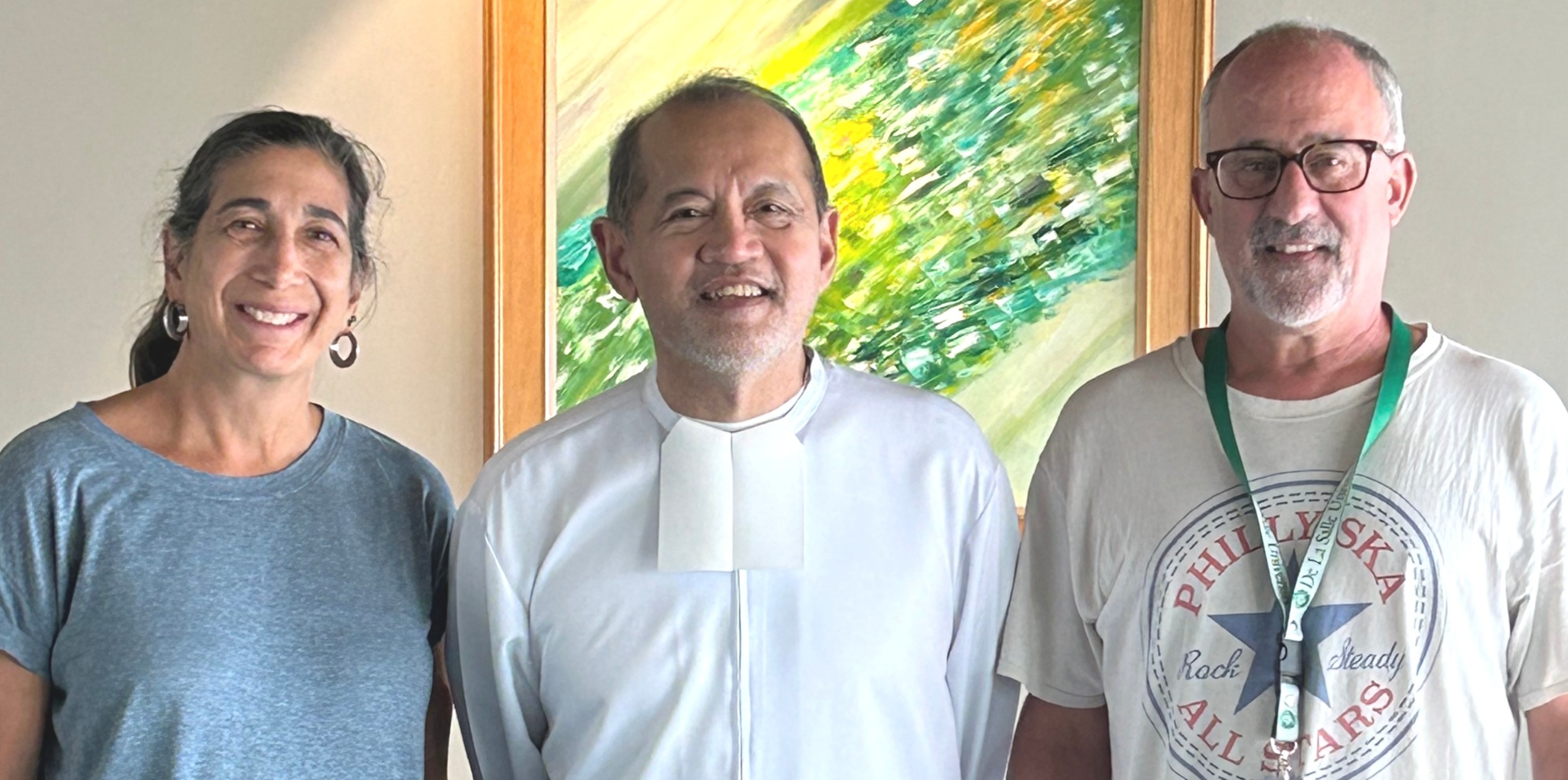La Salle University
As a Distinguished Visiting Professor at De La Salle University in Manila, Philippines, Professor of Sociology Charles A. Gallagher, Ph.D., saw the extremes of wealth and poverty.

Left to right: Alexia Chororos, wife of Charles A. Gallagher, Ph.D., Brother President Bernie S. Oca, and Charles A. Gallagher, Ph.D.
While the oppressive heat and humidity certainly left a lasting impression on Professor of Sociology Charles A. Gallagher, Ph.D., during his time as the Distinguished Visiting Professor at De La Salle University (DLSU) in Manila, Philippines, this past summer, it was the great contrast of life in Manila that left the greatest memory.
Gallagher spent almost three months at the Lasallian university in downtown Manila where he taught a doctorate and an undergraduate class.
“It’s one of the premiere universities in the Philippines, one of the top three” Gallagher remarked.
Established in 1911 as an elementary and high school for boys, DLSU quickly grew into a post-secondary college exclusively by 1931 and granted University status in 1975. Operated by the Institute of the Brothers of the Christian Schools, the university has approximately 23,000 undergraduate and graduate students.
Gallagher, whose research and teaching focuses on social inequality, race relations, and immigration, was asked to present on immigration both in the United States and Europe at the University and across the country?

“It was really rewarding, especially presenting on American life and what’s going on the United States,” he said.
Gallagher said the students were incredibly respective during his presentations. He noted how the Philippines, a developing country, has a strong juxtaposition between enormous wealth and poverty.
Immediately surrounding the university are dense neighborhoods and city streets packed with cars, scooters, and Jeepneys, small mini buses with open backs where people can jump on and off.

For the more affluent residents, areas such as Malate, where his apartment was located and had the feel of Philadelphia’s University City, and Makati, a relatively new area with gleaming high rises, being inside was a way of life.
“They have their own mall with their own food. All the good restaurants are there,” he said. “It’s like going to the King of Prussia Mall and because it is so hot, no one wants to be outside. It’s an all air-conditioned way of life.”
When it came to the United States, Gallagher said his students got all of their information from the movies.
“They have all of these movies that they like. Modern American gangster movies. Harry Potter. Tom Cruise movies. Zombie stuff. So, this is their version of America and a lot of it, quite honestly, is that America is universally wealthy,” he said.
Gallagher who presented a talk on “The Neglected Story of the United States as Two Nations: Hollywood wealth and the American Dream versus mass incarceration, skyrocketing handgun [and] opioid deaths, and downward socioeconomic mobility” was surprised to learn that his students did not have any knowledge of gun violence in the U.S. or the opioid public health crisis.
“In the Philippines, there are a large number of guns circulating in households. And the ratio really isn’t that much different than in the U.S.,” Gallagher said. “But the only time guns are ever used there is basically in drug crimes against other drug criminals. It’s not the way we do it with the rage and where two thirds of gun deaths are suicides. Suicides are lower there because it’s a very, very devout Catholic country.”

Opportunities for La Salle faculty to create global connections fit neatly with the University’s Ascend 2028 strategic plan which calls for building “bold, sustainable international partnerships.”
“When our faculty have the opportunity to teach internationally, they are really accomplishing two goals,” Provost Shivanthi Anandan, Ph.D., said. “They are able to introduce La Salle globally to new audiences and build connections, and they are bringing back valuable insights and learnings that they are able to share with current students on campus and prepare them to be global citizens.”
Gallagher will have another opportunity in summer 2024 to teach at the American University in Cairo as a Distinguished Visiting Scholar. Like in Manila, he will conduct several lectures on social issues playing out in the U.S. that have larger geo-political implications.